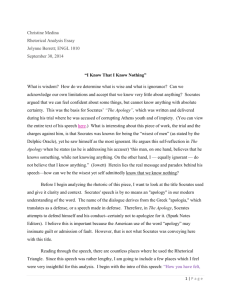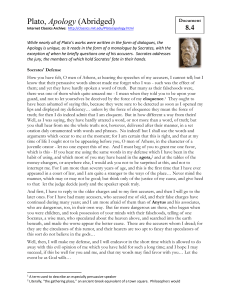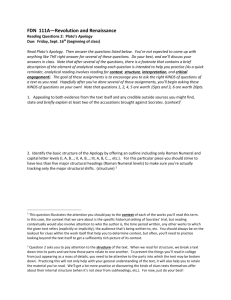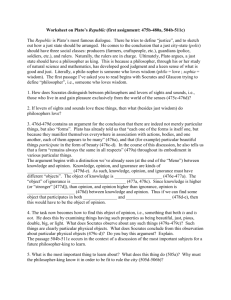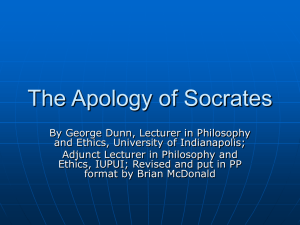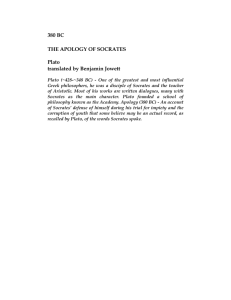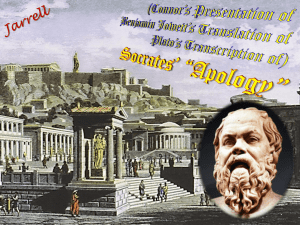AP Language - AP Courses
advertisement
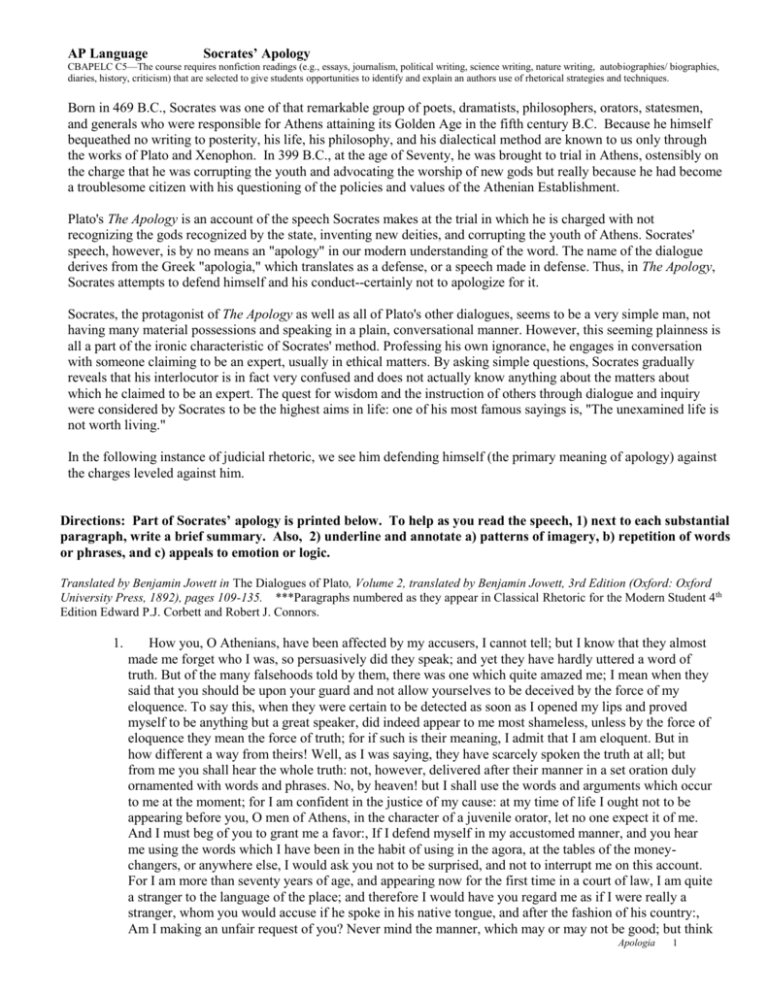
AP Language Socrates’ Apology CBAPELC C5—The course requires nonfiction readings (e.g., essays, journalism, political writing, science writing, nature writing, autobiographies/ biographies, diaries, history, criticism) that are selected to give students opportunities to identify and explain an authors use of rhetorical strategies and techniques. Born in 469 B.C., Socrates was one of that remarkable group of poets, dramatists, philosophers, orators, statesmen, and generals who were responsible for Athens attaining its Golden Age in the fifth century B.C. Because he himself bequeathed no writing to posterity, his life, his philosophy, and his dialectical method are known to us only through the works of Plato and Xenophon. In 399 B.C., at the age of Seventy, he was brought to trial in Athens, ostensibly on the charge that he was corrupting the youth and advocating the worship of new gods but really because he had become a troublesome citizen with his questioning of the policies and values of the Athenian Establishment. Plato's The Apology is an account of the speech Socrates makes at the trial in which he is charged with not recognizing the gods recognized by the state, inventing new deities, and corrupting the youth of Athens. Socrates' speech, however, is by no means an "apology" in our modern understanding of the word. The name of the dialogue derives from the Greek "apologia," which translates as a defense, or a speech made in defense. Thus, in The Apology, Socrates attempts to defend himself and his conduct--certainly not to apologize for it. Socrates, the protagonist of The Apology as well as all of Plato's other dialogues, seems to be a very simple man, not having many material possessions and speaking in a plain, conversational manner. However, this seeming plainness is all a part of the ironic characteristic of Socrates' method. Professing his own ignorance, he engages in conversation with someone claiming to be an expert, usually in ethical matters. By asking simple questions, Socrates gradually reveals that his interlocutor is in fact very confused and does not actually know anything about the matters about which he claimed to be an expert. The quest for wisdom and the instruction of others through dialogue and inquiry were considered by Socrates to be the highest aims in life: one of his most famous sayings is, "The unexamined life is not worth living." In the following instance of judicial rhetoric, we see him defending himself (the primary meaning of apology) against the charges leveled against him. Directions: Part of Socrates’ apology is printed below. To help as you read the speech, 1) next to each substantial paragraph, write a brief summary. Also, 2) underline and annotate a) patterns of imagery, b) repetition of words or phrases, and c) appeals to emotion or logic. Translated by Benjamin Jowett in The Dialogues of Plato, Volume 2, translated by Benjamin Jowett, 3rd Edition (Oxford: Oxford University Press, 1892), pages 109-135. ***Paragraphs numbered as they appear in Classical Rhetoric for the Modern Student 4th Edition Edward P.J. Corbett and Robert J. Connors. 1. How you, O Athenians, have been affected by my accusers, I cannot tell; but I know that they almost made me forget who I was, so persuasively did they speak; and yet they have hardly uttered a word of truth. But of the many falsehoods told by them, there was one which quite amazed me; I mean when they said that you should be upon your guard and not allow yourselves to be deceived by the force of my eloquence. To say this, when they were certain to be detected as soon as I opened my lips and proved myself to be anything but a great speaker, did indeed appear to me most shameless, unless by the force of eloquence they mean the force of truth; for if such is their meaning, I admit that I am eloquent. But in how different a way from theirs! Well, as I was saying, they have scarcely spoken the truth at all; but from me you shall hear the whole truth: not, however, delivered after their manner in a set oration duly ornamented with words and phrases. No, by heaven! but I shall use the words and arguments which occur to me at the moment; for I am confident in the justice of my cause: at my time of life I ought not to be appearing before you, O men of Athens, in the character of a juvenile orator, let no one expect it of me. And I must beg of you to grant me a favor:, If I defend myself in my accustomed manner, and you hear me using the words which I have been in the habit of using in the agora, at the tables of the moneychangers, or anywhere else, I would ask you not to be surprised, and not to interrupt me on this account. For I am more than seventy years of age, and appearing now for the first time in a court of law, I am quite a stranger to the language of the place; and therefore I would have you regard me as if I were really a stranger, whom you would accuse if he spoke in his native tongue, and after the fashion of his country:, Am I making an unfair request of you? Never mind the manner, which may or may not be good; but think Apologia 1 only of the truth of my words, and give heed to that: let the speaker speak truly and the judge decide justly. 2. And first, I have to reply to the older charges and to my first accusers, and then I will go on to the later ones. For of old I have had many accusers, who have accused me falsely to you during many years; and I am more afraid of them than of Anytus and his associates, who are dangerous, too, in their own way. But far more dangerous are the others, who began when you were children, and took possession of your minds with their falsehoods, telling of one Socrates, a wise man, who speculated about the heaven above, and searched into the earth beneath, and made the worse appear the better cause. The disseminators of this tale are the accusers whom I dread; for their hearers are apt to fancy that such inquirers do not believe in the existence of the gods. And they are many, and their charges against me are of ancient date, and they were made by them in the days when you were more impressionable than you are now, in childhood, or it may have been in youth , and the cause when heard went by default, for there was none to answer. And hardest of all, I do not know and cannot tell the names of my accusers; unless in the chance case of a Comic poet. All who from envy and malice have persuaded you, some of them having first convinced themselves, all this class of men are most difficult to deal with; for I cannot have them up here, and cross-examine them, and therefore I must simply fight with shadows in my own defense, and argue when there is no one who answers. I will ask you then to assume with me, as I was saying, that my opponents are of two kinds; one recent, the other ancient: and I hope that you will see the propriety of my answering the latter first, for these accusations you heard long before the others, and much oftener. 3. Well, then, I must make my defense, and endeavor to clear away in a short time, a slander which has lasted a long time. May I succeed, if to succeed be for my good and yours, or likely to avail me in my cause The task is not an easy one; I quite understand the nature of it. And so leaving the event with God, in obedience to the law I will now make my defense. 4. I will begin at the beginning, and ask what is the accusation which has given rise to the slander of my person, and in fact has encouraged Meletus to prefer this charge against me, Well, what do the slanderers say? They shall be my prosecution and I will sum up their words in an affidavit: "Socrates is an evil-doer, and a curious person, who searches into things under the earth and in heaven, and he makes the worse appear the better cause; and he teaches the aforesaid doctrines to others." Such is the nature of the accusation: it is just what you have yourselves have seen in the comedy of Aristophanes, who has introduced a man whom he calls Socrates going about and saying that he walks in air and talking a deal of nonsense concerning matters of which I do not pretend to know either much or little, not that I mean to speak disparagingly of any one who is a student of natural philosophy. I should be very sorry if Meletus could bring so grave a charge against me. But the simple truth is, O Athenians, that I have nothing to do with physical speculations: many of those here present are witnesses to the truth of this, and to them I appeal. Speak then, you who have heard me, and tell your neighbors whether any of you have ever known me hold forth in few words or in many upon such matters. . . . You hear their answer. And from what they say of this part of the charge you will be able to judge of the truth of the rest. 5. As little foundation is there for the report that I am a teacher, and take money; this accusation has no more truth in it than the other. Although, if a man were really able to instruct mankind, to receive money for giving instruction would, in my opinion, be an honor to him. There is Gorgias of Leontium, and Prodicus of Ceos, and Hippias of Elis, who go the round of the cities, and are able to persuade the young men to leave their own citizens by whom they might be taught for nothing, and come to them whom they not only pay, but are thankful if they may be allowed to pay them. There is at this time a Parian philosopher residing in Athens, of whom I have heard; and I came to hear of him in this way:, I came across a man who has spent a world of money on the Sophists, Callias, the son of Hipponicus, and knowing that he had sons, I asked him: '"Callias," I said, 'if your two sons were foals or calves there would be no difficulty in finding some one to put over them; we should hire a trainer of horses, or a Apologia 2 farmer probably, who would improve and perfect them in their own proper virtue and excellence; but as they are human beings, whom are you thinking of placing over them? Is there any one who understands human and political virtue? You must have thought about the matter, for you have sons; is there any one?" 'There is," he said. 'Who is he?" said I; "and of what country? and what does he charge?" "Evenus the Parian," he replied; "he is the man, and his charge is five minae." Happy is Evenus, I said to myself, if he really has this wisdom, and teaches at such a moderate charge. Had I the same, I should have been very proud and conceited; but the truth is that I have no knowledge of the kind. 6. I dare say, Athenians, that some one among you will reply, "Yes, Socrates, but what is the origin of these accusations which are brought against you; there must have been something strange which you have been doing? All these rumors and this talk about you would never have arisen if you had been like other men: tell us, then, what is the cause of them, for we should be sorry to judge hastily of you." Now I regard this as a fair challenge, and I will endeavor to explain to you the reason why I am called wise and have such an evil fame. Please to attend then. And although some of you may think that I am joking, I declare that I will tell you the entire truth. Men of Athens, this reputation of mine has come of a certain sort of wisdom which I possess. If you ask me what kind of wisdom, I reply, wisdom such as may perhaps be attained by every man, for to that extent I am inclined to believe that I am wise; whereas the persons of whom I was speaking have a superhuman wisdom, which I may fail to describe, because I have it not myself; and he who says that I have, speaks falsely, and is taking away my character. And here, O men of Athens, I must beg you not to interrupt me, even if I seem to say something extravagant. For the word which I will speak is not mine. I will refer you to a witness who is worthy of credit; that witness shall be the God of Delphi, he will tell you about my wisdom, if I have any, and of what sort it is. You must have known Chaerephon; he was early a friend of mine, and also a friend of yours, for he shared in the recent exile of the people, and returned with you. Well, Chaerephon, as you know, was very impetuous in all his doings, and he went to Delphi 2 and boldly asked the oracle to tell him whether, as I was saying, I must beg you not to interrupt, he asked the oracle to tell him whether any one was wiser than I was, and the Pythian prophetess answered, that there was no man wiser. Chaerephon is dead himself; but his brother, who is in court, will confirm the truth of what I'm saying. 7. Why do I mention this? Because I am going to explain to you why I have such an evil name. When I heard the answer, I said to myself, What can the god mean? and what is the interpretation of his riddle? for I know that I have no wisdom, small or great. What then can he mean when he says that I am the wisest of men? And yet he is a god, and cannot lie; that would be against his nature. After long consideration, I thought of a method of trying the question. I reflected that if I could only find a man wiser than myself, then I might go to the god with a refutation in my hand. I should say to him, "Here is a man who is wiser than I am; but you said that I was the wisest." Accordingly I went to one who had the reputation of wisdom, and observed him, his name I need not mention; he was a politician whom first among I selected for examination, and the result was as follows: When I began to talk with him, I could not help thinking that he was not really wise, although he was thought wise by many, and still wiser by himself; and thereupon I tried to explain to him that he thought himself wise, but was not really wise; and the consequence was that he hated me, and his enmity was shared by several who were present and because I heard me. So I left him, saying to myself, as I went away: conceit of Man, although I do not suppose that either of us knows anything really beautiful and good, I am better off than he is, for he knows nothing, and thinks that he knows; I neither know nor think that I know. In this latter particular, then, I seem to have slightly the advantage of him. Then I went to another who had still higher pretensions to wisdom, and my conclusion was exactly the same. Whereupon I made another enemy of him, and of many others besides him. 8. Then I went to one man after another, being not unconscious of the enmity which I provoked, and I lamented and feared this: but necessity was laid upon me, the word of God, I thought, ought to be considered first. And I said to myself, I must go to all who appear to know, and find out the meaning of the oracle. And I swear to you, Athenians, by the dog I swear!, for I must tell you the truth, the result of my mission was just this: I found that the men most in repute were all but the most foolish; and that others Apologia 3 less esteemed were really wiser and better. I will tell you the whole of my wanderings and of the 'Herculean' labors, as I may call them, which I endured only to find at last the oracle irrefutable. After the politicians, I went to the poets; tragic, dithyrambic, and all sorts. And there, I said to myself, you will be instantly detected; now you will find out that you are more ignorant than they are. Accordingly, I took them some of the most elaborate passages in their own writings, and asked what was the meaning of them, thinking that they would teach me something. Will you believe me? I am almost ashamed to confess the truth, but I must say that there is hardly a person present who would not have talked better about their poetry than they did themselves. Then I knew that not by wisdom do poets write poetry, but by a sort of genius and inspiration; they are like diviners or soothsayers who also say many fine things, but do not understand the meaning of them. The poets appeared to me to be much in the same case; and I further observed that upon the strength of their poetry they believed themselves to be the wisest of men in other things in which they were not wise. So I departed, conceiving myself to be superior to them for the same reason that I was superior to the politicians. 9. At last I went to the artisans; I was conscious that I knew nothing at all, as I may say, and I was sure that they knew many fine things; and here I was not mistaken, for they did know many things of which I was ignorant, and in this they certainly were wiser than I was. But I observed that even the good artisans fell into the same error as the poets;, because they were good workmen they thought that they also knew all sorts of high matters, and this defect in them overshadowed their wisdom; and therefore I asked myself on behalf of the oracle, whether I would like to be as I was, neither having their knowledge nor their ignorance, or like them in both; and I made answer to myself and to the oracle that I was better off as I was. 10. This inquisition has led to my having many enemies of the worst and most dangerous kind, and has given occasion also to many calumnies. And I am called wise, for my hearers always imagine that I myself possess the wisdom which I find wanting in others: but the truth is, O men of Athens, that God only is wise; and by his answer he intends to show that the wisdom of men is worth little or nothing; he is not speaking of Socrates, he is only using my name by way of illustration, as if he said, O men, he is the wisest, who, like Socrates, knows that his wisdom is in truth worth nothing. And so I go about the world, obedient to the god, and search and make enquiry into the wisdom of any one, whether citizen or stranger, who appears to be wise; and if he is not wise, then I show him that he is not wise; and my occupation quite absorbs me, and I have no time to give attention to any public matter of interest or to any concern of my own, but I am in utter poverty by reason of my devotion to the god. 11. There is another thing:—young men of the richer classes, who have not much to do, come about me of their own accord; they like to hear the pretenders examined, and they often imitate me, and proceed to examine others; there are plenty of persons, as they quickly discover, who think that they know something, but really know little or nothing; and then those who are examined by them, instead of being angry with themselves are angry with me: this confounded Socrates, they say; this villainous misleader of youth!, and then if somebody asks them, Why, what evil does he practice or teach?, they do not know, and can't tell; but in order that they may not appear to be at a loss, they repeat the ready-made charges which are used against all philosophers about teaching things up in the clouds and under the earth, and making the worse appear the better cause; for they do not like to confess that their pretense of knowledge has been detected, which is the truth; and as they are numerous and ambitious and energetic, and are drawn up in battle array and have persuasive tongues, they have filled your ears with their loud and inveterate calumnies. And this is the reason why my three accusers, Meletus and Anytus and Lycon, have set upon me; Meletus, who has a quarrel with me on behalf of the poets; Anytus, on behalf of the craftsmen and politicians; Lycon, on behalf of the rhetoricians: and as I said at the beginning, I cannot expect to get rid of such a mass of calumny all in a moment. And this, O men of Athens, is the truth and the whole truth; I have concealed nothing, I have dissembled nothing. And yet, I know that my plainness of speech makes them hate me, and what is their hatred but a proof that I am speaking the truth?, Hence has arisen the prejudice against me; and this is the reason of it, as you will find out either in this or in any future enquiry. Apologia 4
